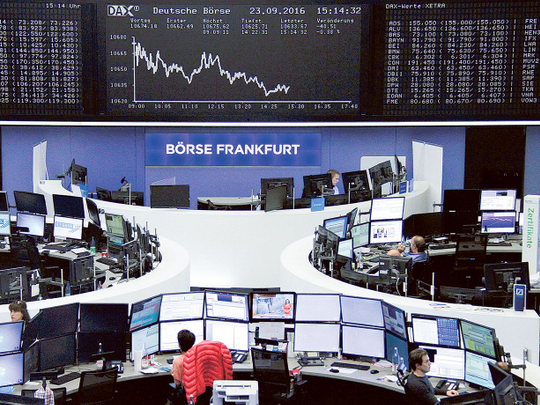
Frankfurt: The rebound in global markets sputtered as stocks slid around the world and German bonds retreated.
The MSCI All-Country World Index of shares declined for the first time in five days, with lenders weighing on European stocks. German bonds pared their best week since May as a rally fuelled by central bank policy decisions in the US and Japan ebbed. Longer-dated Treasuries were on course for their biggest weekly advance since July.
Stocks, bonds and commodities climbed this week and the dollar lost ground versus almost all of its major peers as the Federal Reserve left interest rates unchanged and scaled back plans for increases in 2017 and beyond. Investor sentiment also got a lift as the Bank of Japan strengthened its commitment to reviving inflation, while Indonesia and Turkey cut interest rates and New Zealand’s central bank signalled further easing.
“Underlying concerns were ignored in the excitement about the Fed postponing a rate hike so we saw a bit of a rally,” said Ralf Zimmermann, a strategist at Bankhaus Lampe in Dusseldorf, Germany. “But in reality, whether the fed hikes in September or December doesn’t make any fundamental difference, so it’s not surprising that now investors are taking a step back.”
Stocks
The MSCI All-Country World Index fell 0.3 per cent as of 12:30pm in London, as the Stoxx Europe 600 Index retreated 0.8 per cent. European shares are still heading for their best weekly performance in more than two months with a 2.1 per cent gain. A measure of European share volatility dropped 0.6 per cent, on course for its lowest level since December 2014.
CaixaBank SA was among the biggest decliners as banks tumbled the most of the Stoxx 600’s 19 industry groups. The Spanish lender lost 3.7 per cent after selling shares to fund its takeover of Portugal’s Banco BPI SA. Commodity producers fell from a six-week high, led by a 7.8 per cent plunge in Polymetal International Plc after two investors said they’ll sell 13 million shares of the miner.
Nestle SA slid 1.6 per cent, the most since June, after analysts said that a presentation by the world’s biggest food company indicated that organic sales growth may be lower than currently anticipated by the market.
Futures on the S&P 500 Index fell 0.2 per cent after the US benchmark rose to a two-week high on Thursday. The technology-heavy Nasdaq 100 Index closed at a record peak. Regional Fed chiefs for Atlanta, Philadelphia and Cleveland’s Loretta Mester — who voted against this weeks decision — may comment on US monetary policy when they appear as panellists at a conference on Friday.
Facebook Inc lost 2.4 per cent in premarket New York trading after saying it gave advertisers an erroneous metric for the average time users spent watching a video, a miscalculation earlier reported in the Wall Street Journal.
The MSCI Emerging Market Index of shares retreated 0.2 per cent, paring a weekly gain to 3.8 per cent — still its biggest since July 15. Eight of 11 industry groups in the index declined, led by financial stocks and utilities.
Exchange-traded stock and bond funds focused on emerging markets registered $20.5 billion of uninterrupted inflows in the past 16 weeks as shares from Johannesburg to Istanbul gained and currencies rallied.
Currencies
The Bloomberg Dollar Spot Index was little changed, headed for a 0.8 per cent weekly loss after the Fed’s decision. The kiwi dropped 0.7 per cent on Friday amid speculation that New Zealand’s central bank will cut interest rates at its next policy meeting in November.
The pound slid 0.9 per cent to $1.2962, wiping out a two-day rally. Foreign Secretary Boris Johnson said Thursday that the UK government is leaning toward triggering formal talks on leaving the European Union in the early part of next year.
An index of developing-market currencies dropped less than 0.1 per cent, with Malaysia’s ringgit and the Philippine peso leading declines. The MSCI Emerging Markets Currency Index is up 1.3 per cent this month and 2.2 per cent since the end of June, heading for a third straight quarterly gain.
Turkey’s lira fell 0.2 per cent, paring a 1 per cent gain this week, after Erdogan signalled he would continue to pressure the central bank to reduce borrowing costs and said he isn’t worried if the country is cut to junk by credit rating firms.
South Africa’s rand rose 0.3 per cent, extending the biggest gains in September among 31 major currencies tracked by Bloomberg to 8.4 per cent.
Bonds
Germany’s 10-year yield was at minus 0.089 per cent, 10 basis points lower this week. Data Friday showed that Germany’s economy lost momentum at the end of the third quarter as near-stagnation in the services sector offset an improvement in manufacturing.
The yield on similar-maturity Spanish bonds has fallen 14 basis points this week, and touched a record-low 0.897 per cent on Thursday.
The Bloomberg Global Developed Sovereign Bond Index rose 1.3 per cent this week through Thursday, when Janus Capital Group’s Bill Gross said a bear market in government debt has been delayed by the actions of monetary authorities.
Bonds also advanced across most of Asia, with China’s 10-year yield dropping two basis points to 2.74 per cent. Rates in Australia and New Zealand fell to two-week lows of 2.00 per cent and 2.40 per cent, respectively. Japan’s 30-year bonds rose, pushing their yield down by five basis points to 0.47 per cent. The move comes two days after the Bank of Japan said it would shift the focus of monetary policy to shaping the yield curve.
US Treasuries due in a decade yielded 1.61 per cent, little changed from Thursday and down seven basis points from a week ago. The 30-year bond yield dropped to its lowest in two weeks Friday following the central bank’s decision. The yield difference, or spread, between two- and 30-year securities headed for its biggest weekly decline since early July.
Turkish bonds fell the most among emerging-market debt on Friday, with the yield on 10-year notes gaining seven basis points to 9.28 per cent.
Banca Monte dei Paschi di Siena SpA’s subordinated bonds fell to an eight-month low after Reuters said the lender may have to seek state support. A spokesman for Italy’s third-largest bank declined to comment on the report. The lender’s 379 million euros ($424 million) of 5.6 per cent bonds due September 2020 dropped two cents on the euro to 64 cents, according to data compiled by Bloomberg.












